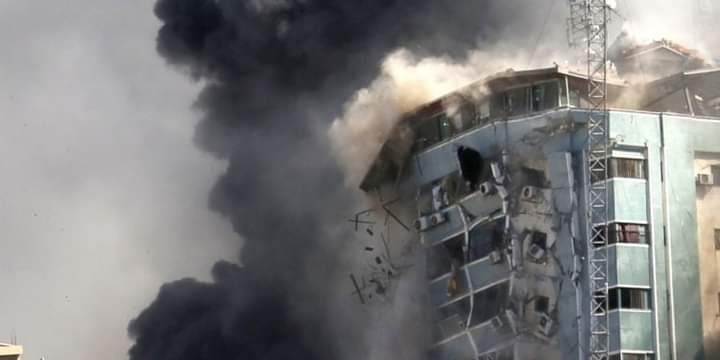
Israeli airstrikes on Gaza City flattened three buildings and killed no fewer than 42 people yesterday, Palestinian medics said.
Despite the heavy death toll and international efforts to broker a cease-fire, Israeli Prime Minister Benjamin Netanyahu said the fourth war with Gaza’s Hamas rulers would rage on.
Netanyahu, in a televised address yesterday, said the attacks were continuing at “full-force” and will “take time.”
Israel “wants to levy a heavy price” from the Hamas militant group, he said. He was flanked by his defence minister and political rival Benny Gantz in a show of unity.
Since violence flared last Monday, at least 188 Palestinians, including 55 children, have been killed in the Gaza Strip. More than 1,200 others have been wounded. In the occupied West Bank, Israeli forces have killed at least 13 Palestinians.
Israel has reported 10 dead, including two children, from the thousands of missiles fired from Gaza by Hamas and other Palestinian groups, many of which were intercepted by Israel’s Iron Dome air defence system.
The Israeli air assault early yesterday was the deadliest single attack, marking the worst fighting since their devastating 2014 war in Gaza.
The airstrikes hit a major downtown street of residential buildings and storefronts over the course of five minutes after midnight, destroying two adjacent buildings and one about 50 yards (meters) down the road.
At one point, a rescuer shouted, “Can you hear me?” into a hole in the rubble. “Are you OK?” Minutes later, first responders pulled a survivor out and carried him off on an orange stretcher. The Gaza Health Ministry said 16 women and 10 children were among those killed, with more than 50 people wounded, and rescue efforts are still underway.
Earlier, the Israeli military said it destroyed the home of Gaza’s top Hamas leader, Yahiyeh Sinwar, in a separate strike in the southern town of Khan Younis. It was the third such attack in the last two days on the homes of senior Hamas leaders, who have gone underground.
Israel appeared to have stepped up strikes in recent days to inflict as much damage as possible on Hamas as international mediators work to end the fighting and stave off an Israeli ground invasion in Gaza.
But targeting the group’s leaders could hinder those efforts. A United States (U.S.) diplomat has been deployed in the region to de-escalate tensions. The United Nations (UN) Security Council was also meeting yesterday.
In its airstrikes, Israel has leveled a number of Gaza City’s tallest office and residential buildings, alleging they contain Hamas military infrastructure. Among them was the building housing The Associated Press office and those of other media outlets.
The latest violence broke out in east Jerusalem last month, when Palestinian clashed with police in response to Israeli police tactics during Ramadan and the threatened eviction of dozens of Palestinian families by Jewish settlers.
A focal point of clashes was the Al-Aqsa Mosque, a frequent flashpoint that is located on a hilltop compound that is revered by both Muslims and Jews.
Hamas fired rockets toward Jerusalem last Monday, triggering the Israeli assault on impoverished Gaza, which is home to more than two million Palestinians and has been under an Israeli and Egyptian blockade since Hamas seized power from rival Palestinian forces in 2007.
Speaking alongside Netanyahu yesterday, Israel’s military chief, Lt. Gen. Aviv Kohavi, said Hamas did not anticipate Israel’s overwhelming response to its rocket fire. “Hamas made a serious and grave mistake and didn’t read us properly.”
The turmoil has spilled over, fueling protests in the occupied West Bank and stoking violence within Israel between its Jewish and Arab citizens, with clashes and vigilante attacks on people and property.
Yesterday, a driver rammed into an Israeli checkpoint in the east Jerusalem neighbourhood of Sheikh Jarrah — where the Palestinian families had been threatened with eviction — injuring six officers before police shot and killed the attacker, Israeli police said.
The violence also sparked pro-Palestinian protests in cities across Europe and the United States, with French police firing tear gas and water cannons at demonstrators in Paris.
However, UN Secretary-General Antonio Guterres called for an immediate ceasefire, saying in his address to the council that hostilities between the two parties were “utterly appalling” and urging them to “allow mediation efforts to intensify and succeed”.
The UN Security Council (UNSC) had privately met twice last week over the worsening violence, but has so far been unable to agree on a public statement because the US – a strong ally of Israel – did not believe it would be helpful, diplomats said.
China voiced regret that the U.S. has blocked a UNSC statement on Israeli-Palestinian violence as it urged greater international efforts to stop the bloodshed.
“We call upon the U.S. to shoulder its responsibilities, take a just position, and together with most of the international community support the Security Council in easing the situation,” said Chinese Foreign Minister Wang Yi, who chaired Yesterday’s meeting as China is council president for May.













